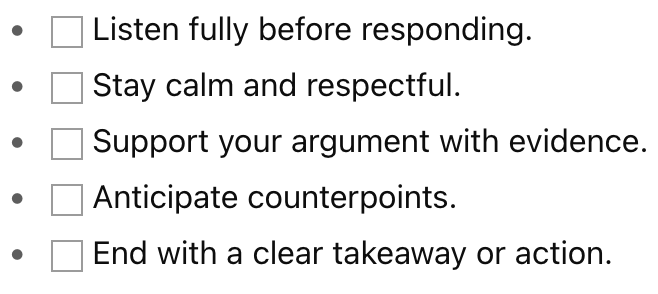Disagreements are normal; how you handle them makes the difference.
Good debate skills mean listening, responding with respect, and backing up your points with clear reasoning. These skills are useful not only in class debates, but also in the workplace, relationships, and everyday conversations.
🧑🤝🧑 Arguing Respectfully
- Listen first: Don’t interrupt; let the other person finish.
- Acknowledge valid points: “I see where you’re coming from…” builds respect.
- Stay calm: Avoid raising your voice or using insults.
- Attack ideas, not people: Critique the argument, not the person making it.
- Use “I” statements: “I believe…” or “I feel…” instead of “You’re wrong…”
👉 Pro tip: People are more likely to listen to you if they feel heard themselves.
🗣️ Persuasive Speaking & Writing Basics
- Start with a clear thesis: Know your main point.
- Use evidence: Facts, statistics, examples, or expert quotes.
- Organize logically: Introduction → Main Points → Conclusion.
- Anticipate objections: Address counterarguments before they come up.
- End with a call to action: What do you want your listener/reader to do or think?
🧠 Critical Thinking in Debate
- Check sources: Don’t rely on rumors or unverified claims.
- Avoid logical fallacies (false comparisons, strawman arguments, ad hominem attacks).
- Be open-minded: Winning isn’t the goal — learning is.
- Know when to agree to disagree: Some topics won’t have a neat resolution.
📋 Quick Tips for Everyday Discussions
- Pause before responding — quick reactions can lead to misunderstandings.
- Ask clarifying questions: “What do you mean by that?”
- Summarize the other person’s point to show you understood.
- Keep body language open and non-threatening.
- Respect time — don’t dominate conversations.
✅ Quick Checklist

🔑 Key Takeaway
Respectful debate builds understanding.
When you combine calm listening with persuasive reasoning, you don’t just “win” arguments — you build trust, credibility, and stronger relationships.

